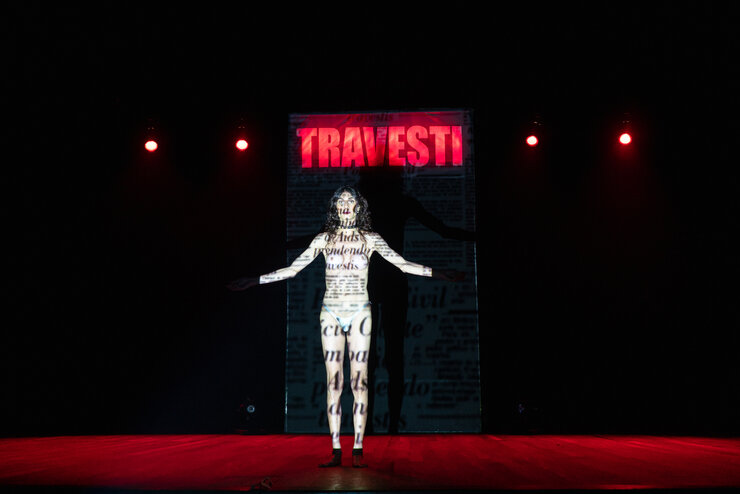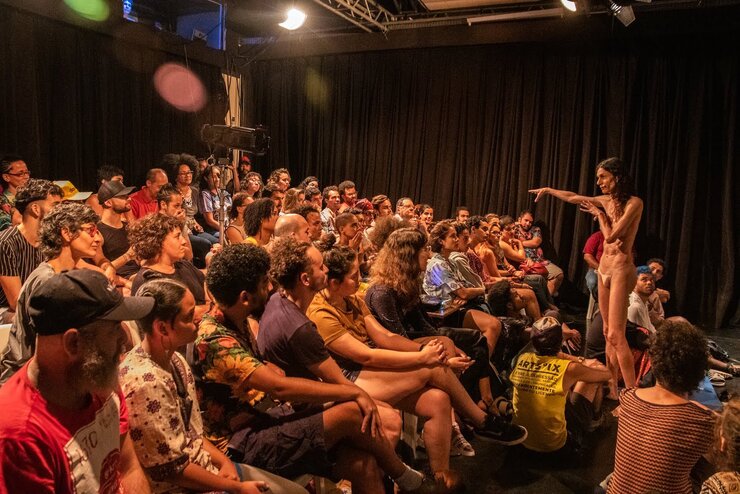«Being at the forefront of a movement is very lonely.»
Interview with Renata Carvalho
Renata Carvalho is a travesti (1) and has been an actress and theatre director for 22 years. From different perspectives, she explores the intersections of travestility, representativeness and (de)marginalisation of trans bodies in social and artistic contexts. From 26 to 28 August, she will perform her «Manifesto Transpofágico», which questions the language of theatre itself by subtly making transphobic and colonial structures visible. In conversation with Jô Osbórnia – poet and interpreter during her Zurich performances – she talks about the simultaneity of fear and respect on the part of her audience, about the successes and ongoing discrimination against travestis and trans artists in the last few years after the pandemic, and about the research she conducts during her tours.
Jô Osbórnia: Renata, «Manifesto Transpofágico» has toured the world and was performed in famous theatres, such as the Théâtre de la Ville in Paris and the Teatrino di Palazzo Grasi in Venice. I have followed your Brazilian performances on Instagram, the theatres were always packed. What was it like, or is it like, to take «Manifesto Transpofágico» abroad or to travel around the country and the world with your work? And in what period of time did all this happen?
Renata Carvalho: «Manifesto Transpofágico» was conceived before the pandemic, but mainly produced after. It is interesting to observe the historical development that these pandemic years have implicated for the representativeness of travestis and trans people. In art, for example, it is already agreed that the representation of our bodies by cisgender bodies is simply unacceptable. So the debate is now on, but there is still a price to pay. Being at the forefront of a movement is very lonely.
Do you experience some kind of healing on tour? Do you find that performing «Manifesto» brings improvement?
Yes and no. I often ask myself how to deal with all this. After I performed «Jesus», for example, I received endless death threats. The events of my life ultimately become the basis of my art. This is how I heal. When we founded MONART – National Movement of Trans Artists in Italy, my fear my was at its peak – knowing how the performances had gone in other countries. But the reactions of the international audience surprised me. In general, I have the feeling that the discussion in Europe always revolves around the difference between travestis and trans people. I remember how in France they tried to convince us to add an «e», a feminine term, to the Brazilian word «travesti» – a European way to fix something disturbing. On the other hand, the European public and the interest of the big theatres have guaranteed a certain backing. It's like getting legitimacy for my own research from abroad.

How do these legitimisation processes take place? And what is the impact of your contact with European institutions and audiences?
I have the impression that the inclusion of travestis and trans people in European art – although problematic – has happened quite quickly in recent years. When the documentary «Disclosure» was released on Netflix in 2020, many people said to me: «Renata, this is exactly what you've been researching for years in Brazil: trans fake and the representation of travestis and trans people in the media and art!» What comes from outside legitimises what comes from within – this is how the dynamics of this colonial world still work. It is up to us to reflect on the power that such legitimisation from outside can actually bring us. But I personally realised something else in my contact with the European institutions: while I have a certain white conspicuousness in Brazil, here in Europe I become a visible Black woman.
How do this legitimisation and racialisation concretely affect the performances of «Manifesto»?
Usually, it's across the spectrum between respect and fear: on the one hand, the public respects me more and more as the debate has become more informed and my work better known in recent years. People understand how important my research is as a transpologist. The respect also comes from the fact that I have become a public figure. Today I am the travesti whose opinion matters, the travesti who is consumed, the travesti who is listened to. That carries weight. On the other hand, fear always remains latent. In Europe, transphobia is veiled, institutionally, and in addition to that, there are many other things for a migrant travesti: the loss of home, the knowledge of the impossibility of returning, the loneliness abroad. In Brazil, the fear is much more immediate: it's about the fear of being murdered if you go out on the street. «Manifesto» focuses on the guts, on the structures of this transphobia – and in a very targeted way.
Can you explain your strategy in more detail?
Perhaps this can best be explained by the discursive strategies of resistance of the Brazilian writer and poet Conceição Evaristo, because it was Black feminism that made me realise the necessity of naming: To name the oppression, to name the logic of fear; in short, to name the unspoken, the veiled, the taboo. Roland Barthes also speaks of «fascism in language» and how we can confront it through the act of renaming. The «Manifesto» starts from this assumption and acts strategically in the language of theatre and performance itself.
I believe that the success of this work lies in the symbolism of language and in the search for its own rupture. Both acts of the play are radically opposed to each other. In the first act, the entire staging is rather classical and pleasant: the light is dim and only used selectively, the frequencies and sounds are chosen so that they do not disturb the audience. In the second act, there is a break: the curtain opens and I begin a dialogue with the audience, half-naked. What was previously theatrical and meticulously calculated is now suspended. The careful and pleasant transforms into the broken and uncomfortable, which in turn introduces and establishes the interaction with the audience.
During your tour you continue your research and visit other migrant travestis. What do you take away from these encounters
The international performances have allowed me to get to know travestis in Europe better. The diaspora of Brazilian travestis in search of more humane living conditions and better paid jobs has been a reality for decades. Portugal, Italy, France and Switzerland are the main countries of this exodus. I was very happy to meet the «Tietas»(2) of Europe in person, like Camile Cabral among many others. I am also very happy to now travel to Portugal and get in touch with Keyla Brasil who recently did a brave action against the transfake issue. This dialogue not only makes me address the loneliness of migrant travestis, many of whom don't even learn Portuguese properly and simply have nowhere to go. It also makes me realise the strength they have.

Are you also in contact with contemporary travestis like Jota Mombaça and Castiel Vitorino Brasileiro who have followed similar paths abroad?
Yes, international recognition is the basis for the development of our work, it is like the mechanism I described above: Jota and Castiel have been recognised and have occupied institutions where no travesti was allowed before. Dialogue is also taking place on this front. It is as if our diaspora has now also become artistic. Unlike the first generations from the 1970s and 1980s, there are now countless travestis fleeing to Europe in search of opportunities other than prostitution, many even with degrees or the prospect of higher education. This has to do with issues of class and access, of course, but it is still remarkable how many of us have appeared in prestigious European art spaces for the first time in the last five years. This not only breaks the matrix of transphobic colonial thinking, but also the very selective logic of representation. Whenever I leave an art institution, I always ask myself: who is next?
This reminds me of the murdered politician and journalist Marielle Franco and her well-known phrase «One rises and takes the others with her».
Indeed. If art really has a transformative power - precisely because it activates the interaction of self and other – then it must also bear responsibility, target the foundations of its own structures and create a collective and permanent access. This is important in order to avoid tokenism, but also so that a balance can be struck between the fear and respect we talked about earlier – and finally a counter-design to loneliness!
—
(1) The term «travesti» is used in Latin America for people who were assigned male gender at birth but develop a female gender identity.
(2) Reference to the character «Tieta do Agreste» by the famous writer Jorge Amado.